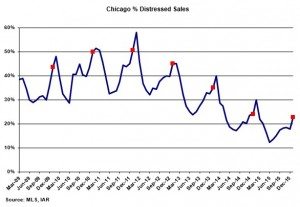Back in February I posted on how the new tax law would affect the rent vs. buy decision. However, I got to thinking that it might be instructive to work through a real example rather than just pontificate from an ivory tower. I was actually a little surprised by the result.
Before I dive into the details keep in mind that the result of this analysis is normally not as simple as option A is better than option B. In reality it strongly depends on how long you plan on staying in a particular home because the buying transaction costs get spread over that time horizon and the longer you rent the higher the rent becomes. For instance, renting may make more sense with a 5 year horizon but buying might win out over a 7 year horizon.
There are a lot of personal parameters and assumptions that go into this analysis so I need to lay that out. First, I used a mythical married couple living in Chicago, earning $200,000/ year and in the process of replicating their DNA. That means that their state income tax would be around $10,000/ year and in 2017 their standard deduction would have been $19,050 but in 2018 it would be $36,000. They were looking at buying unit 2007 in the Legacy.
Unit 2007 closed with parking in February for $645,000 with a $770/ month assessment and it just got rented for $4000/ month. I won’t bore you with the details of this calculation but that doesn’t look like a great investment for the buyer. So if it’s not good for the landlord it must be good for the renter, right? Well, apparently not exactly. Let’s run the numbers based on these facts and assumptions using the New York Times rent vs. buy analysis tool:
- Property taxes should be about $13,800/ year
- Inflation, rent increases, and home price appreciation all 2%/ year
- 30 year mortgage at 3.9% with 20% down => $20,124 interest in first year
- Investment return 5%/ year
- Renter’s insurance $250/ year. Homeowner’s insurance $2000/ year
- Tenant pays all utilities
- $2000/ year in maintenance
- Buyer’s closing costs $5000. Seller’s closing costs 6%.
The New York Times rent vs. buy tool is pretty sophisticated but I believe it does make a key simplifying assumption: that the full amount of your interest and property taxes are deductible. In order to correct this mistake I adjust the marginal tax bracket to reflect the portion of the deductions that end up being deductible. For instance, in 2017 this couple would have been in the 28% marginal tax bracket and their deductions would have exceeded the standard deduction by $24,874. Since that is 73% of the total deduction I adjust the marginal tax bracket to 20.5%.
The result of that analysis is that buying breaks even with renting after only 3 years. If you sell earlier than 3 years renting would be better and later than 3 years buying gets more attractive – with a $4000/ month rent alternative. On the other hand, if you stay put for just 5 years you would need to be able to rent for $3500 or less to break even renting.
However, in 2018 they would not be able to deduct their property taxes at all because their Illinois income tax payments would have used up their entire SALT deduction. Also, with the higher standard deduction they wouldn’t bother itemizing because their total allowable deductions would fall under $36,000. The way I reflect this situation in the analysis tool is to set the marginal tax bracket to 0% to reflect no tax benefit from deductions. In that scenario break even with a $4000/ month rent alternative is 5 years instead of 3 years.
As I mentioned above I was a little surprised that buying was as attractive as it turned out to be since this appeared to be a rather weak investment for the landlord. The renter’s perspective should generally be the mirror image of the landlord’s perspective. However, I guess when your mortgage interest is only 3.9% and the home and rents are appreciating at 2% per year buying looks pretty darn attractive.
#RentVsBuy #Condos #Taxes
Gary Lucido is the President of Lucid Realty, the Chicago area’s full service real estate brokerage that offers home buyer rebates and discount commissions. If you want to keep up to date on the Chicago real estate market or get an insider’s view of the seamy underbelly of the real estate industry you can Subscribe to Getting Real by Email using the form below. Please be sure to verify your email address when you receive the verification notice.
